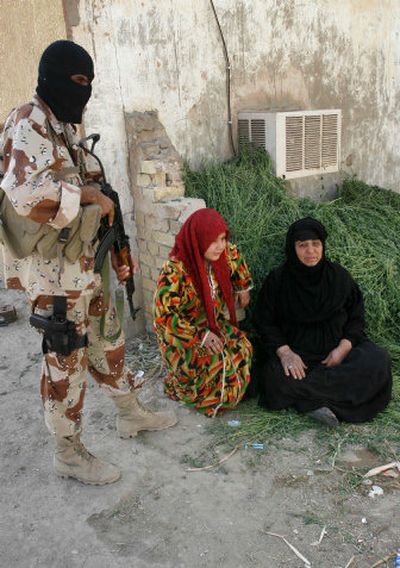Baghdad relatively quiet as Iraqis head to the polls

BAGHDAD, Iraq – Iraqis began voting today to give a “yes” or “no” to a constitution that would define democracy in Iraq, a country once ruled by Saddam Hussein and now sharply divided among its Shiite, Sunni and Kurdish communities.
The polls opened at 7 a.m., just hours after insurgents sabotaged power lines in the northern part of the country, plunging the Iraqi capital into darkness and cutting off water supplies.
The capital was eerily quiet under clear blue skies this morning. Iraqi soldiers and police ringed polling stations at schools, and driving was banned to stop suicide car bombings by Sunni-led insurgents determined to wreck the vote. Only a few citizens were seen walking to the schools, which were protected by concrete barriers and barbed wire.
President Jalal Talabani and Prime Minister Ibrahim al-Jafaari were shown live on Al-Iraqiya television voting in a hall in Baghdad’s heavily fortified Green Zone, where parliament and the U.S. Embassy are based. After putting their paper ballots in white-and-black plastic boxes, both smiled and waved to the public.
“The constitution will pave the way for a national unity,” said al-Jafaari. “It is a historical day, and I am optimistic that the Iraqis will say ‘yes.’ “
Farid Ayar, a top official in the Iraqi Independent Electoral Commission, said voting was being conducted at all the country’s 6,000 polling stations.
Minor violence was reported. A roadside bomb exploded near a polling station in western Baghdad as it opened, injuring one policeman, officials said. U.S. troops exchanged fire with insurgents in Ramadi; it wasn’t immediately clear if anyone was injured. South of Basra, three armed men attacked an empty polling station at 3 a.m.; the three were arrested, police said.
The charter – hammered out after months of bitter negotiations – is supported by a Shiite-Kurdish majority but has split Sunni Arab ranks after last-minute amendments designed to win support among the disaffected minority.
After the blackout, government employees working through the night managed to restore electricity in Baghdad before dawn.
The choice of target may suggest that security measures hampered militants from carrying out the sort of devastating bombings against civilians or police that they have unleashed before the vote. Nearly 450 people were killed in the 19 days before the referendum, often by insurgents using suicide car bombs, roadside bombs and drive-by shootings.
Iraqis remain deeply divided over the approximately 140-charter draft constitution they were voting on today. The country’s Shiite majority – some 60 percent of its 27 million people – and the Kurds – 20 percent – support the charter, which provides them with autonomy in the regions where they are concentrated in the north and south.
Shiite spiritual leader Grand Ayatollah Ali al-Sistani called on followers to go to the polls and back the constitution. A similar call during January parliamentary elections rallied millions of Shiites to vote.
However, the Sunni Arab minority, which dominated the country under Saddam and forms the backbone of the insurgency, widely opposes the draft, convinced its federalist system will eventually tear the country apart into Shiite and Kurdish mini-states in the south and north, leaving Sunnis in an impoverished center. Many of them feel the document doesn’t sufficiently support Iraq’s Arab character.
Last-minute amendments in the constitution, adopted Wednesday, promise Sunnis the chance to try to change the charter more deeply later, prompting one Sunni Arab group – the Iraqi Islamic Party – to support the draft today. Most others still reject it, but a split in the Sunni vote may be enough to ensure its passage.
The United States hopes that the constitution’s success will pave the way for withdrawing American troops.
In Friday sermons across the nation, the message from Shiite pulpits was an unequivocal “yes,” but it was not so clear-cut in Sunni Arab mosques – varying from “yes,” “no” and “vote your conscience.”
In Tikrit, Saddam’s hometown north of Baghdad, Sheik Rasheed Yousif al-Khishman exhorted worshippers at the al-Raheem mosque to reject the charter, saying the draft was an “infidel constitution written by foreign hands.”
In the nearby town of Samarra – another bastion of Sunni militancy – Sheik Adil Mahmoud of the influential Sunni Association of Muslims Scholars delivered a more tempered sermon. “I will go to the polls and vote ‘no,’ but I leave the choice to you,” he said.